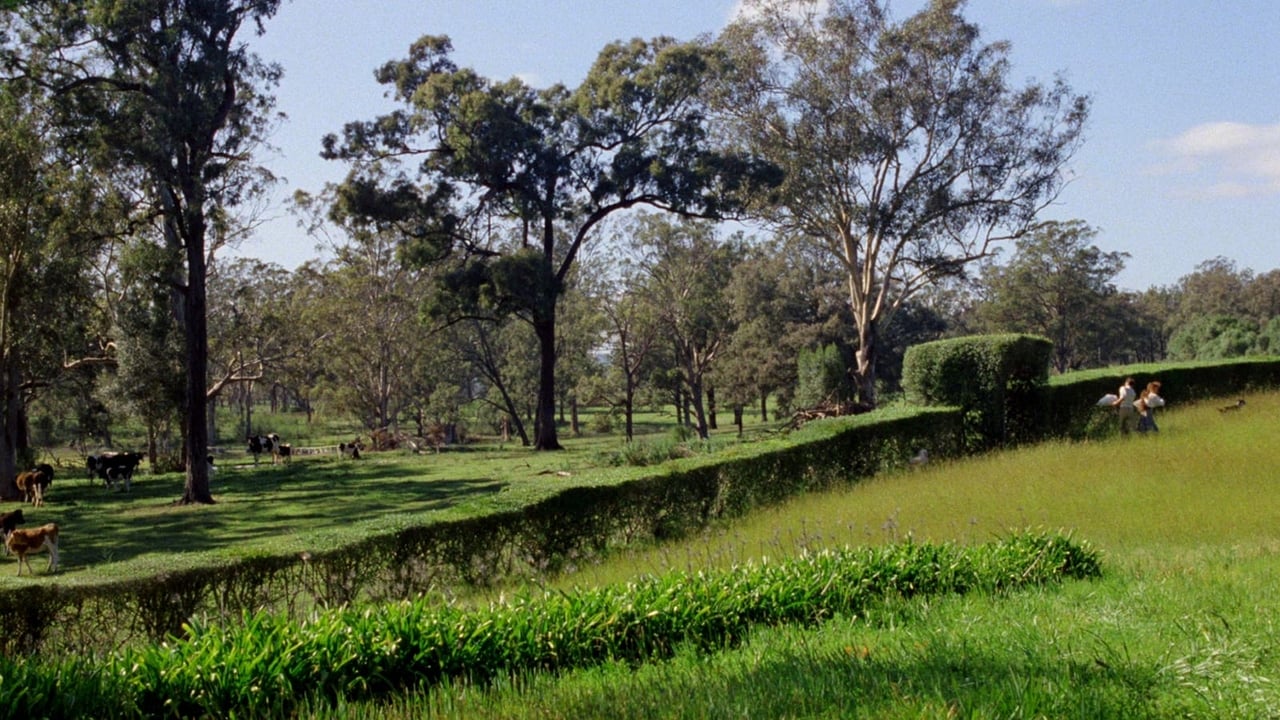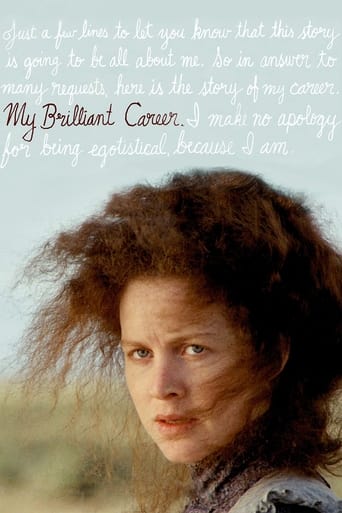

Australian screenwriter, producer and director Gillian Armstrong's feature film debut which was written by Australian author and screenwriter Eleanor Witcombe, is an adaptation of a novel from 1901 by Australian feminist and author Stella Maria Sarah Miles Franklin (1879-1954). It premiered In competition at the 32nd Cannes International Film Festival in 1979, was shot on locations in New South Wales, Australia and is an Australian production which was produced by Australian film producer Margaret Fink. It tells the story about Sybylla Melvyn, a young and aspiring writer who lives with her parents who are farmers and her four younger siblings on the outback in Possum Gully, Australia in 1897. Due to the drought, Sybylla's parents are struggling so much that they can't afford to have her living with them any longer and she is sent off to live with her wealthy grandmother Mrs. Bossier in Caddagat. Sybylla's life becomes better there, but she soon learns that she is expected to find a man and marry. Sybylla is not a believer in marriage and shows little interest for her grandmother's socialite friends, but one day she meets a revered landowner named Harry Beecham who courts her. Sybylla takes a liking to Harry, but she regards herself as unworthy of his affection and therefore does not believe that he will ever love her. Finely and acutely directed by Australian filmmaker Gillian Armstrong, this finely paced period piece which is narrated by the protagonist and from her point of view, draws a refined portrayal of an independent-minded woman who finds herself caught between the expectations of others and her own beliefs and aspirations after meeting a man who touches her heart and who can offer her the kind of life that she has grown up with, but that goes against the dreams she pursues. While notable for it's naturalistic and atmospheric rural milieu depictions, sterling production design by Australian-born Italian production designer Luciana Arrighi, cinematography by Australian cinematographer Donald McAlpine, costume design by Australian costume designer Anna Senior, use of colors and use of music, this character-driven, dialog-driven, somewhat biographical and serene story about a feminist's journey towards self-realization during the late 19th century, depicts a condensed study of character. This literary and charmingly romantic late 1970s Australian New Wave feature film is impelled and reinforced by it's cogent narrative structure, subtle character development and the compelling and memorable acting performances by Australian actress Judy Davis in her first leading role and New Zealand actor Sam Neill in one of his earliest lead roles. An eloquent, involving and mindful drama which gained, among other awards, six AFI Awards at the 21st Australian Film Institute Awards in 1979 and the BAFTA Award for Best Actress in a Leading Role Judy Davis at the 34th British Academy Film Awards in 1981.
... View MoreMy Brilliant Career is a simple and straightforward narrative skillfully told. You will never be required to sit on the edge of your seat, and half a bottle of port would do you nicely. The setting is mostly quaint -- often opulent and petulant -- in outback, and somewhat eccentric, Australia still inside the first one hundred years of white settlement.The story is about a young woman who is the daughter of a struggling rancher and who has a profound passion for the arts. "I'd like to be a pianist", she says with a burst of defiant emotion in a heated confrontation with her contemplative mother. In the end, though, she ends up becoming a writer, and what will torment her is the choice she will have to make.What she has to forfeit is a bright no-nonsense handsome young man. Two years after they had solemnly admitted their feelings for one another, they meet again. At this awkward moment her hands are covered in mud which, like God, stands between her and her lover. " I've got to do it alone", she whispers to him guiltily. At this critical juncture it becomes manifestly clear that God, after all, is indeed a damnable thing. He alone can grant whatever talents we shall hope to have, and only on His terms we are obliged to direct our will.My Brilliant Career is one rare Australian motion picture that does not place emphasis on the scenery which, Australia being the dazzler that it is, is invariably tempting. Instead the interest is focused unabatedly, and without distraction, on the soul and substance of each and every character. It is this quality and discipline that imbued Gillian Armstrong's piece with the magical touch of durability shamefully scarce in Australian cinematography.
... View MoreMy Brilliant Career offers viewers an obviously strong female main character - Judy Davis who is the proverbial radical with a cause. Her feminist stance is not well received in the early 1900's patriarchal society. Davis' character, Sybylla is quintessentially balanced by a debonair leading man, Sam Neill as Harry Beecham, who is up for her feminine challenge. The couple reflects a dance with daring, in what initially appears to be an amorous destiny. Sam's failure to recognize Sybylla's long-term determination ends in broken-hearted failure to their potential relationship. But what does all of this mean? How can we view this story in retrospect, and receive the value of current interpretation of feminism today? To begin considering these questions, the filmmaker takes a risk in begging the questions in the first place. In a more equitable society - similar to today - it takes far more that a gutsy, intelligent, determined woman to make a feminist mark. The lack of political, economic, and social ideologies, which support feminist thinking today is not apparent in this film. The social impact of the patriarchal society is heavily contrasted, but it does not necessarily reflect it's opposite. To view this story in retrospect, by assuming the culture of the day, and in light of this contrast, Sybylla is truly outstanding woman: physically, psychologically, and definitely mentally! Though her character is not representative of a archetypal feminist, but rather, one of a philosophical dreamer, with a very strong will and determination. If Sib's character is symbolic in some similar feminist manner, it may only be that she would eventually become a respected, foundational influence on other budding independent, female writers. And while Sib was challenged by other main characters, it is not clear that she actually changed their minds or values, and hence her impact was minimal at best. As an independent women, not feeling a need to be supported by a man, and in additional to her high determination, we might consider Sib a compatriot of Virginia Wolf - women who were coming into their own, but still very uncertain of the social and political climate of their day - not ours. While this movie is both charming and humorous, I definitely would have enjoyed seeing the outcome: an intelligent, strong headed woman succeeding in her writing, developing her sense of self - in conflict with her environment, and likely, the realization that a woman can have her Brilliant career and her man too!
... View MoreWatching this film made me think of what a strong character Sybylla is. In a time when doing something like trying to have a career, as a woman, was basically not done we are introduced to someone who is so head strong that she doesn't care what anyone says. One thing that I really enjoyed about this movie is the relationship between Sybylla and Harry Beecham because of the way it was presented. Usually a love relationship in a film is something that is just expected after one interaction, the audience should just know that since we see these two characters together they are now in love, nothing that you see actually develop on screen with multiple encounters and a progress of feelings. I felt like a huge part of this story was the development of the Harry/Sybylla connection. It's obvious early in the film that she cares for no one else, when she throws the flowers given to her by Frank in the river we see she has no intention of giving him a second thought. We see through the numerous encounters with these two that they both have very strong feelings for the other and it is finally revealed when he proposes to her. She takes this offer very seriously but realizes that if she is to be true to herself she cannot accept his offer. This hurts both of them very much and we can see that when she is teaching the family that her father is indebted to and she is not able to write him a letter. When he shows up at her family's farm two years later and re-offers his proposal it is another account of just how much she means to him. When she declines again it is for her reasons and for her career that she is not able to accept. I think that this is a great characteristic of her in this film and helps to make the point of how she is such a strong willed woman who will not settle for less then what she knows she is capable of.
... View More